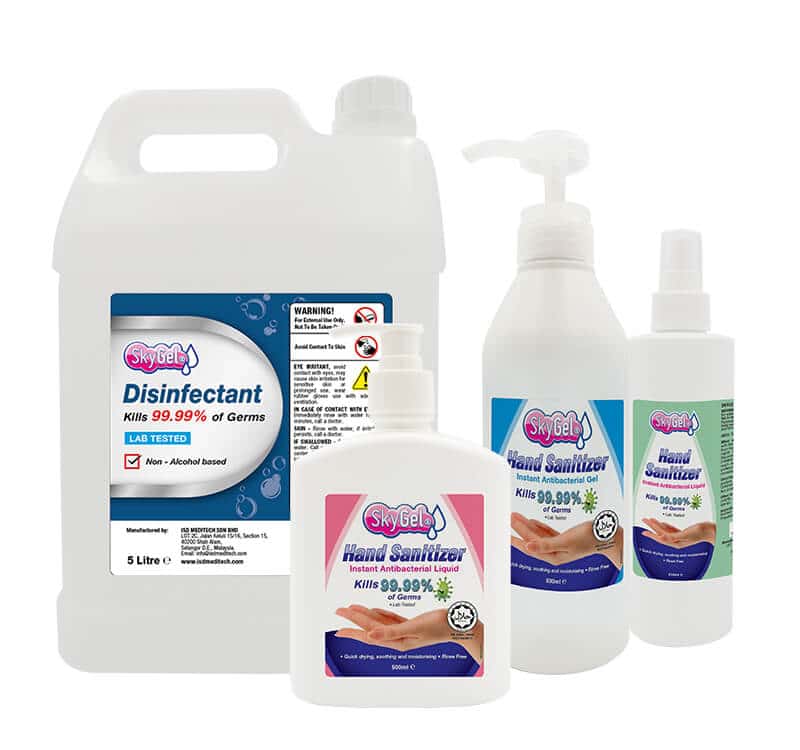HAND hygiene is gradually becoming part of our daily practice since the Movement Control Order (MCO) started.
While a concern has been raised to practice the right hand wash, the selection of the right type of hand sanitisers has not been emphasised.
An effective hand sanitiser containing a proper type of disinfectant would be the best way to reduce the risk of catching infections.
The most typical and effective type is the hand sanitisers containing at least 60 percent of alcohol, specifically ethanol (ethyl alcohol), isopropanol (isopropyl alcohol) or a combination of them.
Alcohol-based hand sanitisers of 60 – 80 percent alcohol are proven to be effective against many types of bacteria and viruses including HIV, influenza A virus and severe acute respiratory syndrome coronavirus (SARS-CoV) which is of a similar strand of virus to Covid-19 (SARS-CoV-2).
Given that Covid-19 or coronavirus in general is an enveloped RNA virus, alcohol has the ability to dissolve the fat membranes, very similar to the soap action against coronavirus.
You may also notice the presence of other ingredients in hand sanitisers which are usually gelling agents for sanitising gel and humectants (e.g. glycerol, propylene glycol) to keep the skin emollient.
The presence of humectants is also important to prevent the skin from damage caused by the alcohol.
Our skin contains lipids which are important to maintain our skin protection function against germs and foreign substances.
WHO has recommended the addition of hydrogen peroxide at 0.125 percent in hand rub formulation which serve as an additional disinfectant towards the killing of viruses. Hydrogen peroxide is able to produce free radicals that attack the fat membranes of viruses.
Then, there’s alcohol-free hand sanitisers. However, we must be cautious when choosing these types of hand sanitisers. There are alcohol-free hand sanitisers containing antimicrobial agents or in general a preservative such as quarternary ammonium compounds (for instance, benzalkonium chloride and alkyl dimethyl benzyl ammonium chloride) and chlorhexidine digluconate.
A recent study in Germany has proven that the use of 0.05 – 0.2 percent benzalkonium chloride and 0.02 percent chlorhexidine are less effective against coronaviruses such as SARS-CoV.
The inclusion of such compounds in hand sanitisers might not be sufficient to kill Covid-19 thoroughly.
Another type of alcohol-free hand sanitisers is those containing colloidal silver nanoparticles. Silver is commonly used in industrial applications but at a low concentration silver is able to show antibacterial and antiviral activities.
Silver nanoparticles are metallic particles in a nano size which is usually within 1 – 100 nm. Therefore, it can bind to viruses and prevent them from in contact with the host cells.
Owing to a relatively smaller size of silver nanoparticles as compared to SARS-CoV-2 of Covid-19, it has shown to be effective against several types of viruses including HIV, hepatitis B virus, herpes simplex virus and influenza virus. However, at present, there is no clear evidence of its effectiveness against coronaviruses.
Sodium hypochlorite or sodium salt of hypochlorous acid has also emerged as an alternative alcohol-free hand sanitisers. Sodium hypochlorite can be commonly found in household bleach which is useful disinfectant and potentially dangerous chemical. However, this chemical at a low concentration is widely used in wound management and in dentistry as antiseptic agents.
Sodium hypochlorite is effective to at a concentration of at least 0.21 percent based on the study by the German research group aforementioned. Given such a low concentration, the use of this chemical compound has no published evidence causing systemic toxicity and local reactions which could be life-threatening.
Despite being described as potentially non-irritant to the skin at such a low concentration, the use of this type disinfectant in the form of hand sanitisers must be careful. Inappr
opriate administration of sodium hypochlorite into the eye might cause irritation.
Of course, homemade hand sanitisers made up of ingredients such as vinegar and essential oils (e.g. tea tree oil) are not proven scientifically to be effective.
It is advisable for public to choose the right type of hand sanitisers and to practice hand washing with soap which is the best hand hygiene practice against Covid-19 than using a hand sanitiser.
Hand sanitisers are considered as cosmetic products which are regulated under the Control of Drugs and Cosmetics Regulations 1984.
In any circumstance that a proper information about hand sanitisers is unavailable or the source is suspicious, it is recommended to check the official website of the National Pharmaceutical Regulatory Agency, Ministry of Health Malaysia under the category of cosmetic product
(https://www.npra.gov.my/index.php/en/consumers/information/products-sear…). Consumers are recommended not to be fooled by the inappropriate advertisement and testimonies in the social media for choosing the wrong type of hand sanitisers.
Article Source : https://www.nst.com.my/opinion/letters/2020/04/586594/hand-sanitisers-what-you-need-know

